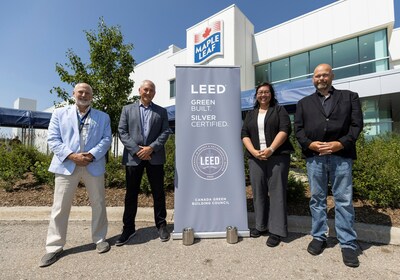
Maple Leaf Foods, the world’s first major carbon neutral food company, today celebrates being awarded the Leadership in Energy and Environmental Design (LEED) Silver certification by the Canada Green Building Council at its Heritage plant in Hamilton, Ontario. LEED is an international certification recognizing sustainability excellence and green building leadership.
Maple Leaf Foods received a $2.6 million grant from the City of Hamilton supporting the incorporation of many innovative and environmentally responsible design features which provide environmental and community benefits.
“We are really proud of what we have achieved at our Hamilton facility, and deeply appreciate the support we have received form the City of Hamilton,” said Randy Huffman, Maple Leaf Foods’ Chief Food Safety and Sustainability Officer. “It has been a journey to get here, and we look forward to leveraging our learnings as we continue to pursue our vision of being the most sustainable protein company on earth.”
Mr. Huffman welcomed Deputy Mayor and Councillor (Ward 4) Tammy Hwang and Councillor Mark Tadeson (Ward 11) at the ceremony and thanked the City of Hamilton for its support. Councillors Tadeson and Hwang also spoke at today’s event.
The Journey to LEED Certification
An industry leader in sustainability, Maple Leaf Foods officially opened the Hamilton plant in 2014, allowing it to bring together operations from five other smaller sites into this more efficient and automated facility. The plant spans approximately 500,000 sq ft. of floor space and employs more than 900 team members who make a wide variety of hot dogs and deli meats – more than 500 products in total.
In the past few years, the Heritage facility has implemented several initiatives that have led to gradual reductions in Maple Leaf Foods’ environmental impact including, a national LED lighting retrofit program, equipment efficiency and optimization upgrades, ammonia heat recovery and wasted heat recovery systems, composting and recycling programs, control measures and closed-loop systems for water use, and improvements to storage, handling and employee training to reduce food waste.
As a result, Heritage has reduced its electricity intensity by 72.9%, natural gas intensity by 47.2%, water intensity by 54.8% all from a 2014 baseline, it’s solid waste intensity by 51% from a 2015 baseline, and food waste intensity by 45.4% since 2016. Key building features that went into creating this ‘green’ facility include measures to encourage alternative transportation such as a bicycle storage area and the use of low emitting and fuel-efficient vehicles, optimizing energy performance, enhanced refrigeration management, water use reduction and using low-emitting materials, and maximizing open space to encourage interaction with the environment, among other environmentally friendly features.
Receiving LEED certification is a significant multi-year accomplishment for the plant team who haveplayed a significant role in achieving this milestone in becoming a certified facility. Heritage is the second LEED certified building at Maple Leaf Foods, following the Meadowvale head office located in Mississauga, Ontario. To learn more about Maple Leaf Foods’ commitments to sustainability efforts, visit www.MapleLeafFoods.com
About Maple Leaf Foods
Maple Leaf Foods is a carbon neutral company with a vision to be the most sustainable protein company on earth, responsibly producing food products under leading brands including Maple Leaf®, Maple Leaf Prime®, Maple Leaf Natural Selections®, Schneiders®, Schneiders® Country Naturals®, Mina®, Greenfield Natural Meat Co.®, Lightlife® and Field Roast™. The Company employs approximately 14,000 people and does business primarily in Canada, the U.S. and Asia. The Company is headquartered in Mississauga, Ontario and its shares trade on the Toronto Stock Exchange (MFI).








